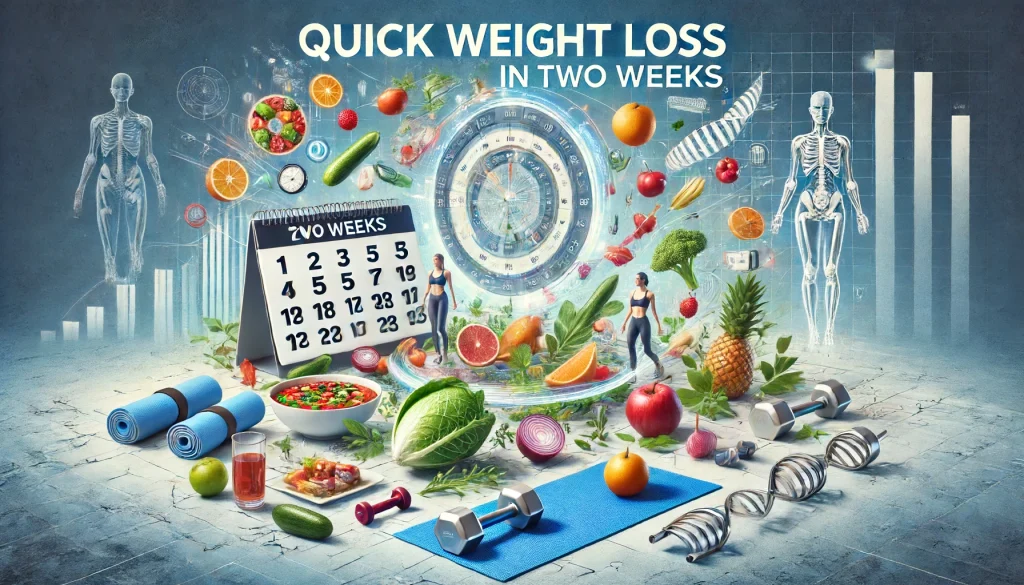Lose weight in two weeks – Your Accelerated Weight Loss Plan
Starting a weight reduction plan is often intimidating, especially when time is of the essence and you need swift results. Whether it’s for an upcoming event or the beginning of a broader health regimen, shedding pounds within two weeks is ambitious but feasible with the proper approach. Explore a detailed strategy that integrates dietary changes, physical activity, and lifestyle modifications to ensure your quick weight loss is both effective and maintainable.
Understanding Quick Weight Loss: Shed pounds in a fortnight
Quick weight loss involves shedding a considerable amount of weight within a short duration. It’s appealing to many, but it’s essential to focus on health and sustainability when pursuing such goals. The objective is to devise a weight loss regimen that not only delivers prompt results but also fosters habits that prevent future weight gain.
Establishing Achievable Goals
The foundation of any effective weight loss program is realistic goal-setting. Knowing what’s possible within two weeks helps keep you motivated and provides a definitive measure for progress. Losing 1-2 pounds per week is safe and maintainable. Beyond just weight, setting goals for better fitness and dietary habits offers a comprehensive health approach.
Developing a Balanced Diet
Creating a calorie deficit—consuming fewer calories than your body burns—is crucial for weight loss. Determining your daily caloric needs based on personal factors like age, gender, weight, height, and activity level helps in setting a caloric target conducive to weight loss.
Focus on nutrient-dense foods to ensure your body receives essential vitamins, minerals, and macronutrients for optimal function. Prioritize:
- Proteins: Lean meats, beans, and dairy.
- Fibers: Veggies, fruits, and whole grains.
- Healthy Fats: Avocados, nuts, and olive oil.
Water plays a vital role in metabolic processes and aids in weight loss by helping curb appetite and enhancing metabolism.
Enhancing Exercise Regimens
High-intensity interval training (HIIT) effectively maximizes fat burning in a short period. These workouts, alternating between intense bursts and rest, elevate your metabolism and increase calorie burn during and post-exercise.
Building muscle through resistance training not only shapes the body but also raises your basal metabolic rate, boosting calorie expenditure even when at rest. Integrating strength training a few times weekly can significantly aid in fat loss and muscle definition.
Staying active throughout the day with simple actions like using stairs, walking during breaks, or engaging in active hobbies can significantly enhance calorie burning.
Lifestyle Tweaks for Optimal Outcomes
Adequate sleep is essential for effective weight loss, as insufficient sleep can upset appetite-regulating hormones, increasing hunger and potential weight gain. Aim for 7-9 hours of sleep nightly to aid your weight reduction efforts.
High stress can cause emotional eating and weight gain. Managing stress through methods like meditation, yoga, or deep breathing can help maintain a balanced weight loss strategy.
Monitoring your progress with food and exercise logs or within a community can foster motivation and accountability. Engaging with friends, family, or a weight loss group for support can help you remain committed.
By integrating a thoughtful diet, vigorous exercise, and key lifestyle changes, you can achieve quick, healthy, and sustainable weight loss. Remember, the goal is not just rapid weight loss but establishing lasting healthy habits.
Supplements and Weight Management: Lose weight in two weeks
While considering supplements for your two-week weight loss goal, approach with caution and conduct thorough research. Not all supplements are beneficial; some might have negative effects or minimal benefits.
- Suggested Supplements: Supplements like caffeine, green tea extract, and protein powders might enhance your weight loss by boosting metabolism, increasing fat burning, or curbing appetite. These should complement—not replace—your dietary and exercise efforts.
- Supplements to Avoid: Steer clear of supplements promising immediate weight loss without lifestyle changes. Such products often contain excessive stimulants or unproven ingredients that are ineffectual or possibly dangerous.
Always seek advice from a healthcare provider before introducing supplements to your routine, particularly if you have pre-existing health issues.
Common Mistakes to Avoid: Shed Pounds in a Fortnight
Setting overly strict calorie limits can seem like a direct path to weight loss but often results in long-term setbacks. Extremely low-calorie diets can slow metabolism, reduce muscle mass, and cause feelings of deprivation, making sustained weight loss challenging. Aim for a moderate calorie deficit that supports your nutritional and energy needs.
Rest days are as important as active days in any weight loss plan. They allow your muscles to recover and grow stronger, reducing injury risks and burnout. Implementing adequate rest and recovery, like sufficient sleep and active recovery activities, promotes sustainable weight loss and overall health.
Maintaining Weight Loss
The real challenge often lies in maintaining weight loss
Post the initial rapid phase. Transitioning to sustainable health habits is crucial:
- Maintain a Balanced Diet: Continue a diet rich in whole foods, balancing macronutrients to meet your body’s needs without severe calorie cuts.
- Regular Physical Activity: Keep up with cardio and strength training to sustain metabolic rates and muscle mass.
- Lifestyle Priorities: Continue valuing good sleep, stress management, and hydration as foundational health aspects.
Safe and Effective Fast-Track Weight Loss
Achieving weight loss in two weeks is viable with a well-rounded approach that encompasses proper nutrition, regular exercise, and lifestyle modifications. Remember:
- Establish Realistic Goals: Know what’s achievable in two weeks and target sustainable weight reduction.
- Focus on Balanced Diet and Exercise: Aim for a calorie deficit through healthy eating and consistent physical activity, rather than depending solely on supplements or severe dietary limits.
- Recovery and Long-Term Plans: Don’t overlook the importance of rest and recovery, and begin planning for lasting lifestyle changes to preserve your weight loss.
By adhering to these principles, you can initiate your weight loss journey healthily and sustainably, laying the groundwork for long-term health and wellness.

FAQs: Lose weight in two weeks
Is Rapid Weight Loss Safe?
- Quick weight loss can be safe if managed correctly, but caution is advised. Rapid reductions can lead to muscle loss, nutritional deficits, and a slowed metabolism without a balanced diet and proper hydration. Consult a healthcare provider or dietitian before beginning any swift weight loss regimen.
What is a Realistic Weight Loss Expectation in Two Weeks?
- Health experts suggest a safe and achievable target is losing 1-2 pounds per week, making a loss of up to 4 pounds possible over two weeks for most. Results can vary based on starting conditions, adherence to the diet plan, and individual metabolic rates. Initial weight loss often includes water weight.
Can I Lose Weight Without Exercising?
- While diet is the primary factor in weight loss, exercise enhances results and supports overall health. Achieving a calorie deficit through dietary adjustments can lead to weight reduction without exercise. However, including physical activity can quicken weight loss, improve muscle tone, and boost metabolism. Even mild activities like walking or yoga significantly contribute to weight loss efforts.
How to Sustain Weight Post Two Weeks?
- After a quick weight loss phase, it’s essential to continue sustainable practices to maintain your results:
- Adopt a Balanced Diet: Transition to a moderate calorie deficit or maintenance intake that supports your weight goals without deprivation.
- Regular Exercise: Find an enjoyable, sustainable exercise routine, focusing on cardio and strength training.
- Set New Goals: Keep motivated by setting fresh fitness or health goals.
- Monitor Your Progress: Track your food intake and weight to make necessary adjustments.
- Practice Mindful Eating: Pay attention to hunger signals and savor your meals to avoid overeating.
What If I Don’t See Results?
- Weight loss plateaus are common and can be frustrating. If progress stalls:
- Reevaluate Your Calorie Intake: Adjust your intake as needed since calorie needs decrease with weight loss.
- Change Your Routine: Vary your workout to challenge your body differently.
- Ensure Adequate Sleep: Poor sleep can hinder weight loss efforts.
- Manage Stress: High stress can lead to weight retention. Find stress reduction methods that work for you.
- Seek Professional Guidance: If you’re stuck, consult a healthcare provider or dietitian for tailored advice and adjustments.
Sharing is Caring!
